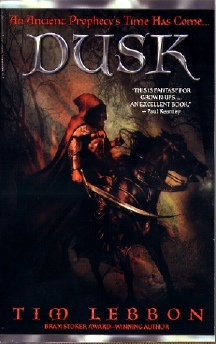 |
 Tim Lebbon
Tim Lebbon
Dusk
Reviewed by: Rick Kleffel © 2006
Spectra / Bantam
US Trade Paperback Original
ISBN 0-553-38364-7
Publication Date: January 31, 2006
386 Pages; $12.00
Date Reviewed: 02-26-06
Index:
Fantasy
Horror
Science Fiction
Never in my life have I been more eager to read a sequel than I am to read 'Dawn', the sequel to 'Dusk'. I didn’t want to put 'Dusk' down, not even when I got to the end. I even read the end pages, the sneak preview of the sequel — something I never do -- because I wanted more of this story. Tim Lebbon has written a book that is compelling, haunting, terrifying and shocking, fully creating a world no one would want to live in but about which everyone will want to read. This genre-bender, skillfully melding horror with fantasy and with (maybe, if you squint a bit) just a soupcon of science fiction, is a fine addition to the New Weird, the wave of new literature of the fantastic that is doing wonderful things infusing new life into genres that were becoming mired in computers, elves and gore.
Like many New Weird tales, 'Dusk' is about a place at least as much as it is about people. Noreela is an ailing island; the soil is losing its potency for growing crops, there are sinkholes that resemble whirlpools, and some areas have become so barren that nothing but bedrock remains. The cause of this degradation is the departure of magic from Noreela three centuries ago, coinciding with end of the Cataclysmic War. At the end of the war, the Mages were driven north, past the archipelago and into the unknown world that is outside Noreela. Magic left them at the same time it left the land. At the same time, all machines — powered by magic — ceased to function.
The Red Monks are ever on the lookout for the return of magic, so that they might destroy it once again before it ever takes hold, thereby depriving the Mages of the weapon they used in despicable ways to enslave the land and its people. The Shantasi warriors, on the other hand, are also on the lookout for magic in order to nurture and protect it, keeping it safe from the Mages but giving new life to the land. And in between are the witches, who lost their magic but found natural ways of practicing it, along with those who find magic in huge, lost libraries, and those who mine fledge, the drug that takes them into the minds of the earth, the air, the rocks and all those who inhabit them.
Into this world is born Rafe Baburn, a boy who, for reasons he cannot fathom, leads a Red Monk to attack his village and insanely slaughter all those who live therein. The only survivors are him and a thief, a man who follows him when he flees to Pavisse for protection with his uncle. Rafe meets there with a witch, and Kosar meets with A’Meer, a Shantasi warrior, and together the four flee south and east to escape the pursuing Red Monks. There they meet with a librarian and a fledge miner who has himself escaped horrors newly arrived underground. The band of six, wholly inadequate to the trials they are to face, move on toward Kang Kang and The Blurring. Soon they are running not just from the Red Monks, but from the Mages, who have reawakened to the promise of renewed magic that seems to run through Rafe.
This is not a land of beauty or joy, and it repeatedly shows the frightened and wholly inadequate band of travelers how inept and hopeless their quest truly is. How can you have a quest with no object? Where can they go to find safety from the powerful forces that pursue them? When even the land cries out in misery, how can six people find some measure of protection from the evil that pursues them so relentlessly from every direction?
The slaughter that begins the book describes the tenor of the novel: life is nasty, brutish and short, and people die for absolutely no good reason, in the most horrific ways. Pleasure seems hard to find in Noreela, much less joy. Lebbon’s reputation as a horror writer of great skill is clearly on display in this novel in which strange, unknowable creatures — tumblers, who resemble tumbleweeds with terrible spikes and a malicious intelligence; the Nax, slumbering but vicious creatures of the fledge mines; machines composed of flesh as well as metal; and the Mages themselves, beautiful and powerful and unspeakably hideous, not physically, but in who and what they are. But this is not a pure horror novel; it is a novel of dark fantasy, a novel that partakes of the tropes of the quest, of the Land, and of the magical child.
The writing is exquisite. The characters are fully formed. The sense of place is so strong that you feel you are living there. Several different societies are lovingly described and take firm hold in the imagination. The fear, the horror, the wonder are clearly felt. The mysteries await solutions. As 'Dusk' descends on the land in a truly shocking ending, one weirder and more horrifying than any I’ve ever read, all that remains for the reader is an all-encompassing desire to know: what happens next?
|
 |
